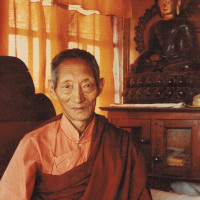When you meditate, do not try to have good thoughts, do not try to keep away bad thoughts, do not try to stop thoughts, and do not try to go after them. Rather, rest in a state of being aware of the thoughts as they arise. This way, when bad thoughts arise, they arise out of the emptiness of mind and fall back into the emptiness of mind. The same is true for good thoughts. This same process of examination can be applied to the many other traps of personality and physiology. For instance, are your emotions of desire and anger coming from the same mind, or from different minds? And, as to the sounds, tastes, sights, smells, and sensory experiences which can be so pleasing or displeasing to you, are these coming from the same mind, or from different minds? When you take the time to thoroughly examine such issues, you will eventually come to conclusions that help formulate later stages of realization. In realizing the inherent emptiness of all reality, you will realize that the essence of the mind (which is also empty) pervades all things; as such, it is the seat of dharmakaya. When you recognize that the clarity of the mind is also its natural state of being, you will realize that clarity as such is the seat of sambhogakaya. For a buddha, who rests in natural liberation in dharmakaya, the clarity of mind, the seat of sambhogakaya, allows knowledge of the three times of past, present, and future. In recognizing that the many thoughts that arise in the mind are essentially unimpeded, you will realize that unimpededness as such is the seat of nirmanakaya. It is wholly because of the unimpededness of pure mind that buddhas manifest in forms of ordinary and supreme incarnations in the nirmanakaya state in order to benefit all sentient beings.

Kalu Rinpoche
from the book
Read a random quote or see all quotes by Kalu Rinpoche.
Further quotes from the book Gently Whispered :
- The basic problem
- The path of Mahayana
- Not feeling totally at the mercy of one’s emotion
- A shift in attention
- Expressing emotions
- Spacious meditation